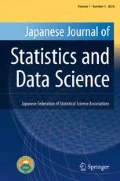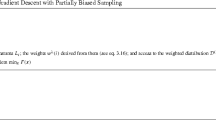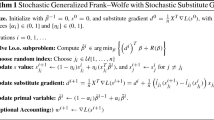Abstract
We construct an objective function that consists of a quadratic approximation term and an \(L^q\) penalty \((0<q\le 1)\) term. Thanks to the quadratic approximation, we can deal with various kinds of loss functions into a unified way, and by taking advantage of the \(L^q\) penalty term, we can simultaneously execute variable selection and parameter estimation. In this article, we show that our estimator has oracle properties, and even better property. We also treat stochastic processes as applications.
Similar content being viewed by others
Notes
The prime denotes the matrix transpose.
References
Bradic, J., Fan, J., & Jiang, J. (2011). Regularization for Cox’s proportional hazards model with np-dimensionality. Annals of Statistics, 39(6), 3092.
Clinet, S., & Yoshida, N. (2017). Statistical inference for ergodic point processes and application to limit order book. Stochastic Processes and their Applications, 127(6), 1800–1839.
De Gregorio, A., & Iacus, S. M. (2012). Adaptive lasso-type estimation for multivariate diffusion processes. Econometric Theory, 28(4), 838–860.
Fan, J., & Li, R. (2001). Variable selection via nonconcave penalized likelihood and its oracle properties. Journal of the American statistical Association, 96(456), 1348–1360.
Frank, L. E., & Friedman, J. H. (1993). A statistical view of some chemometrics regression tools. Technometrics, 35(2), 109–135.
Huang, J., Sun, T., Ying, Z., Yu, Y., & Zhang, C. H. (2013). Oracle inequalities for the lasso in the cox model. Annals of statistics, 41(3), 1142.
Kamatani, K., & Uchida, M. (2015). Hybrid multi-step estimators for stochastic differential equations based on sampled data. Statistical Inference for Stochastic Processes, 18(2), 177–204.
Knight, K., & Fu, W. (2000). Asymptotics for lasso-type estimators. Annals of Statistics, 28, 1356–1378.
Masuda, H., & Shimizu, Y. (2017). Moment convergence in regularized estimation under multiple and mixed-rates asymptotics. Mathematical Methods of Statistics, 26(2), 81–110.
Tibshirani, R. (1996). Regression shrinkage and selection via the lasso. Journal of the Royal Statistical Society: Series B (Methodological), 58, 267–288.
Uchida, M., & Yoshida, N. (2012). Adaptive estimation of an ergodic diffusion process based on sampled data. Stochastic Processes and their Applications, 122(8), 2885–2924.
Uchida, M., & Yoshida, N. (2013). Quasi likelihood analysis of volatility and nondegeneracy of statistical random field. Stochastic Processes and their Applications, 123(7), 2851–2876.
Uchida, M., & Yoshida, N. (2014). Adaptive bayes type estimators of ergodic diffusion processes from discrete observations. Statistical Inference for Stochastic Processes, 17(2), 181–219.
Wang, H., & Leng, C. (2007). Unified lasso estimation by least squares approximation. Journal of the American Statistical Association, 102(479), 1039–1048.
Yoshida, N. (2011). Polynomial type large deviation inequalities and quasi-likelihood analysis for stochastic differential equations. Annals of the Institute of Statistical Mathematics, 63(3), 431–479.
Zou, H. (2006). The adaptive lasso and its oracle properties. Journal of the American statistical association, 101(476), 1418–1429.
Author information
Authors and Affiliations
Corresponding author
Additional information
Publisher's Note
Springer Nature remains neutral with regard to jurisdictional claims in published maps and institutional affiliations.
This work was in part supported by Japan Science and Technology Agency CREST JPMJCR14D7; Japan Society for the Promotion of Science Grants-in-Aid for Scientific Research No. 17H01702 (Scientific Research); and by a Cooperative Research Program of the Institute of Statistical Mathematics.
Rights and permissions
About this article
Cite this article
Suzuki, T., Yoshida, N. Penalized least squares approximation methods and their applications to stochastic processes. Jpn J Stat Data Sci 3, 513–541 (2020). https://doi.org/10.1007/s42081-019-00064-w
Received:
Accepted:
Published:
Issue Date:
DOI: https://doi.org/10.1007/s42081-019-00064-w




